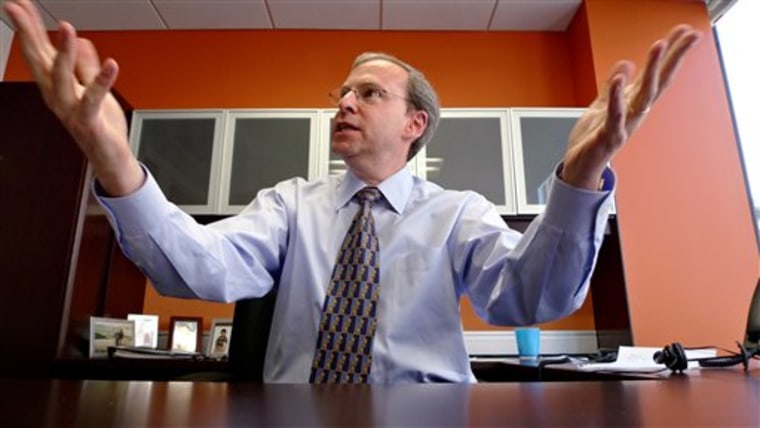Want a daunting job? Try building power in Washington as a fledgling lobbying group whose goal is nothing less than Middle East peace and that sometimes butts heads with one of the capital's most storied lobbies.
J Street's agenda is pro-Israel, but decidedly dovish and liberal. Its tools are a handful of lobbyists, contributions to congressional candidates, and a heavy reliance on the Internet and a few big donors.
It seeks to convince the Obama administration and Congress that American Jews support an aggressive U.S. diplomatic drive to end Israel's decades-long conflicts with the Palestinians and the Arab world, including creating an independent Palestinian state.
The rival American Israel Public Affairs Committee, which remains Israel's undisputed champion in Washington, wants the U.S. to work for peace while pressuring the Palestinians and Arabs for concessions and giving the Israelis latitude to make their own decisions.
‘Deep well of support’
Many U.S. politicians have avoided pushing strongly for peace "because they feared they would be hurt politically," said Jeremy Ben-Ami, J Street's executive director. "Our effort is to try to demonstrate to elected officials that there is in fact a deep well of support for those views."
The year-old group is named for a letter skipped in a sequence of alphabetical Washington streets. It symbolizes the group's aim of "filling a gap in the political map of Washington," says Ben-Ami, who worked in President Bill Clinton's White House and Democrat Howard Dean's presidential campaign.
"They're trying to define how the American Jewish community thinks and talks about this issue, as much as they're trying to focus on the Hill" and the administration, said Rabbi David Saperstein, director of the Religious Action Center of Reform Judaism, the public policy arm of the country's liberal-leaning reform Jews.
While even Ben-Ami acknowledges J Street can't match the influence of the half-century-old AIPAC, some activists say they're not sure the upstart liberal group has much clout at all.
"It's who is being educated, who is persuasive, and who can influence the influentials, and I've yet to see it" from J Street, said Thomas A. Dine, a former AIPAC executive director.
AIPAC won't comment on J Street. AIPAC spokesman Josh Block said his group reflects a consensus for a strong U.S.-Israel relationship.
"AIPAC is not an ideological organization, unlike others on the fringe left or fringe right, who are attempting to promote specific ideological positions that America should then pressure Israel to adopt," Block said.
Behind recent e-mail campaigns
In recent days, J Street says its supporters sent 11,000 e-mails to Capitol Hill urging lawmakers to sign a letter to President Barack Obama backing a strong U.S. role in brokering peace. It sent its three lobbyists to congressional offices with the same message.
The group also generated thousands of e-mails assailing a recent speech to AIPAC by former House Speaker Newt Gingrich, R-Ga., that included a call for tougher penalties against Iran. And it brought 30 supporters to the White House last week to meet with officials.
Those efforts have come during a formative period on Middle East policy for Obama. Palestinian President Mahmoud Abbas comes to the White House this Thursday, following this past week's visit by Israeli Prime Minister Benjamin Netanyahu. Obama flies to Cairo in June to meet with Egyptian President Hosni Mubarak and deliver a speech on U.S. relations with the Muslim world.
Early attention to Middle East peace
Ben-Ami says he's heartened by Obama's early attention to Middle East peace, a contrast to former President George W. Bush, an Israel supporter who largely took a hands-off approach to the conflict.
"We are not finding it necessary at this point to move administration policy or push it in a different direction," Ben-Ami said.
J Street began in April 2008, and most of the $1.2 million it received last year was donated by liberal pro-Israel activists. Ben-Ami says liberal philanthropist George Soros attended a 2006 meeting where ideas for such a group were discussed but bowed out immediately, worried his involvement would draw criticism.
Small staff, small budget
J Street has a staff of 13, a $3 million budget and a single office in Washington. AIPAC has 18 offices around the country and 300 employees, half working in Washington. Its $60 million budget is supplemented by a $140 million endowment.
While Ben-Ami says J Street has nearly 110,000 supporters, that counts many who have simply clicked on the group's Web site for more information or to send e-mails.
AIPAC counts 100,000 dues-paying members and is famous for flexing its muscles. Its annual policy conference in Washington this month drew 6,500 people and included a dinner attended by more than half of Congress and addressed by Vice President Joe Biden. The next day, its members had 515 lobbying meetings with lawmakers or their aides.
J Street's political committee reported steering $580,000 to federal candidates and other committees last year, tops among pro-Israel groups. Thirty-three of the 41 congressional candidates it endorsed won, though most of the races were never competitive.
"It certainly was incredibly helpful," Darcy Burner, an unsuccessful Democratic House candidate in Washington state, said of the $58,000 J Street gave her. But she said the economy and Iraq were the top issues, and "virtually everything else took a back seat."
While AIPAC does not give money to candidates, many of its members are influential campaign contributors as individuals. The organization prides itself on the personal relationships its supporters have with lawmakers.
"Nobody comes close to that," said Rabbi Eric Yoffie, president of the Union for Reform Judaism.
